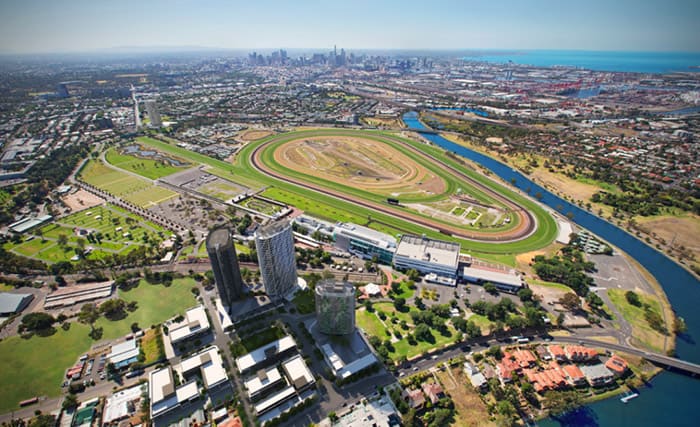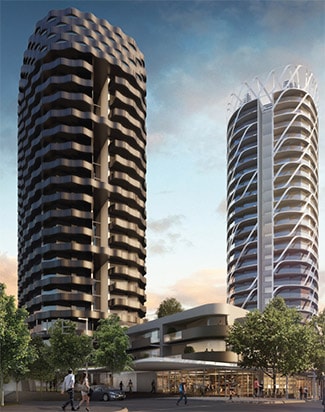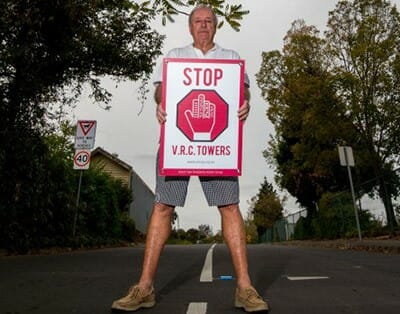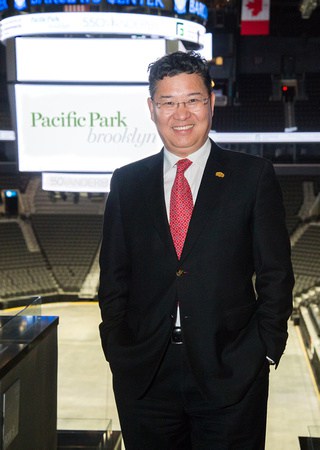
An artist’s rendering shows the proposed high-rise towers next to the racetrack in suburban Melbourne
Officials from one of China’s biggest developers revealed late last week that they were cancelling plans for an 1100-unit residential project in Melbourne, Australia due to unforeseen delays in project approval.
However, Shanghai-based Greenland Group’s project in Melbourne’s Flemington area, which was originally proposed in late 2013, appears to have been thwarted by a government report critical of development plans submitted in November last year, and by local community opposition to introducing a high rise project into the suburban district.
The failed project might be a first for Greenland, which was among the earliest and most active of China’s developers to head overseas. The state-owned giant’s frustrations down under comes as other major mainland developers, including major foreign investors such as Country Garden and Dalian Wanda have had to scale back or abandon overseas projects in the face of opposition from local governments or communities.
Greenland Group Cites Delays in Approvals

Plans for the suburban Melbourne project called for a condo complex reaching 31-storeys in height
“The site needs rezoning before we can start the project, but it took much longer than we expected,” Greenland Australia Managing Director Sherwood Luo told The Australian newspaper late last week, in explaining why the Chinese company was cancelling its pursuit of the Melbourne project.
“They were not able to complete the rezoning process within our expected timeframe, and the completion of the rezoning process was a requirement for executing the contract,” Luo said in the interview.
The initial agreement between Greenland and the site’s current owner, Victoria Racing Club, was signed in late 2013, following successful acquisitions by the Chinese firm in Sydney. However, plans for converting the area surrounding the Melbourne racetrack into a 31-storey condominium site were not submitted for approval until November last year, and once on the table, the city government appears to have dealt with them within weeks.
The site includes two plots of land covering a total of more than 40,000 square metres in an upscale suburban area of a city that has witnessed record increases in home prices since Greenland originally agreed on the investment.
Local Community Pushes Back on Mega-Project

A Melbourne resident protesting plans for the Greenland-invested development
Well before last week’s announcement by Greenland that it was abandoning the Melbourne project, an advisory committee to the city government issued a report in December, which criticised the plans put forward by the racing club to pave the way for the Chinese-invested project as “unsophisticated” and raised concerns over the lack of affordable housing and the high level of density proposed.
City council members quoted in The Age told a hearing in December that, “This development appears to be aimed at the investor market and will deliver more of the same: small one and two bedroom apartments with few measurable controls to ensure reasonable levels of amenity and [an] appropriate mix of dwelling types.”
Greenland took on the Melbourne site around the same time that it successfully sold $246 million in apartments in its initial Sydney project on the first weekend of sales – many of them to Asian investors.
Melbourne city council members recommended in their earlier review that if the project were to move forward that its height should be cut by more than half and that it must include a mix of housing types more appropriate to the local community. Local residents also protested the development over fears of its impact on traffic in the area.
Over the past three years, Greenland has been among the most acquisitive of the mainland’s major players and helped lead the Chinese outbound wave. The developer, which is China’s second-largest by sales purchased multiple sites in Sydney from 2013 onwards, and also took on the $1 billion Metropolis project in Los Angeles in 2013, before investing into Ratner Forest Hills $4 billion Brooklyn Yards (now Pacific Place) project later that year.
Tuition Bills Come Due as Chinese Developers Cross the Border

Within just a few years Greenland chairman Zhang Yuliang took on billions of dollars of projects in Australia, the US, the UK and Malaysia
In the same year that Greenland took on its Melbourne project, another of China’s biggest overseas investors predicted that many of these early ventures would stumble.
”Half of international acquisitions are going to fail, especially for China, which is just going international, but Chinese companies will become international companies sooner or later, so we have to take this step. Failures are our tuition,” Wang Jianlin, chairman of Dalian Wanda, and himself one of China’s biggest purchasers of overseas assets told the Wall Street Journal in 2013.
While the failure rate may not have hit 50 percent, mainland investors are currently encountering some tough times.
Wang himself seems to have admitted defeat in Spain last month when Dalian Wanda quietly chose Chinese New Year’s day to put the Edificio Espana on the market, after agreeing to buy the Madrid landmark for €260 million (then US$358.6 million) in March 2014. Wang had reportedly complained of being treated “like a dog” by Spanish authorities after Wanda’s proposal to demolish and then “rebuild” the historic building had encountered opposition from the local government.
Closer to home base, Country Garden was forced to scale back the size of its proposed 2000 hectare Malaysian project in Johor state by 25 percent, after authorities in Singapore lodged diplomatic protests over plans to build four islands on reclaimed land in the straits dividing Malaysia from its island neighbor.
Chinese investors have also run into trouble with banking acquisitions, with sources in the UK reporting that billionaire Guo Guangchang’s Fosun International dropped an attempt to take over UK merchant bank Kleinwort Benson in December after regulators vetting the deal asked the Chinese investment conglomerate for further clarification of its finances.
More recently, the mainland’s largest developer has become embroiled in a New York controversy over how title to an AIDS nursing home in Manhattan was changed to allow for conversion into luxury condos by a development group led by China Vanke. The city’s comptroller is subpoenaing parties involved to uncover how a private nursing home developer was able to gain approval for converting the non-profit facility for commercial development without first revealing that it had already signed an agreement to sell the site to the Chinese-led group for $116 million.
Leave a Reply